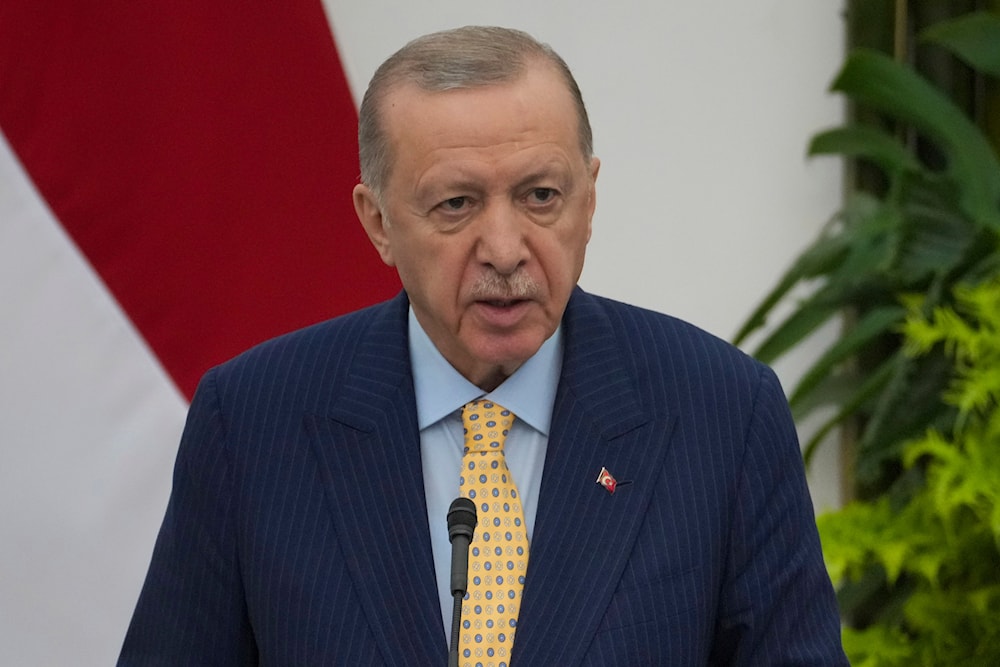Turkish president welcomes agreement between SDF, new Syrian admin
The agreement between the SDF and the new Syrian government integrates the Kurdish militant group into the Syrian army.
-

Turkey's President Recep Tayyip Erdogan speaks during a NEWS conference at Bogor Presidential Palace in Bogor, West Java, Indonesia, February 12, 2025. (AP)
Turkish President Recep Tayyeb Erdogan welcomed the recent agreement between the Kurdish Syrian Democratic Forces and the new Syrian regime.
"The full implementation of the agreement reached yesterday in Syria will contribute to the country’s security and stability. The beneficiaries of this will be all our Syrian brothers and sisters," Erdogan announced on Tuesday in televised comments.
He added "We attach great importance to the territorial integrity of our neighbor Syria, the preservation of its unitary structure, and the strengthening of its unity and stability," while a Turkish official said that Tukiye is "cautiously optimistic" about the deal, emphasizing that the Kurdish group has "made promises before, too, so we are looking at implementation rather than at the expression of intent here."
The US-backed Syrian Democratic Forces (SDF) signed a deal with the new Syrian administration to join Syria's institutions on Monday.
Syria, SDF, sign integration agreement
The Syrian interim presidency announced on March 10 that an agreement had been reached to integrate the Syrian Democratic Forces into the country’s state institutions, while the interim presidency stated that executive committees will oversee the implementation of the agreement by the end of the year.
The most important provisions of the agreement include:
- A nationwide ceasefire across all Syrian territories
- Ensuring the rights of all Syrians in state institutions based on merit, regardless of religious background
- Recognizing the Kurdish community as an integral part of the Syrian state, with full citizenship rights and constitutional protections
- Guaranteeing the right of all Syrians to political representation and participation
- Integrating all civil and military institutions in northeastern Syria under state administration, including border crossings, airports, and oil and gas fields
- Facilitating the return of all displaced Syrians while ensuring their protection by the state
- Supporting the Syrian state in its efforts to combat remnants of the previous regime and all threats to national security and unity
- Rejecting calls for partition, hate speech, and any attempts to sow discord among Syria’s diverse communities
Prior to that, leader of the Kurdistan Workers' Party (PKK) Abdullah Ocalan called for his party to lay down all arms and dissolve on February 27, a decision that Mazloum Abdi, leader of the SDF, welcomed while emphasizing that the decision does not impact his armed group.
Tensions between the Kurdish groups and Turkiye have been on the rise, most recently following Turkish drone strikes targeting Kurdish positions in the al-Shaddadi countryside in southern Hasakah province on February 26.
Moreover, Turkish police arrested 282 members of the Kurdistan Workers' Party (PKK) armed group in raids conducted over the past five days, according to a statement by Interior Minister Ali Yerlikaya on February 18.
The Kurdistan Workers' Party (PKK) announced an immediate ceasefire on March 1, according to a news agency affiliated with the group, following a call from its imprisoned leader, Abdullah Ocalan, urging disarmament.

 3 Min Read
3 Min Read








